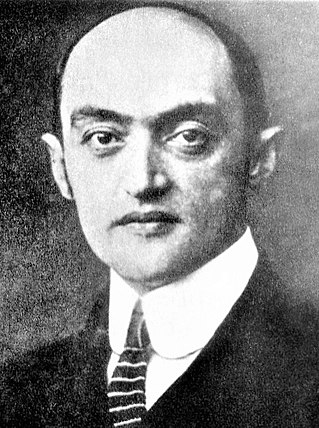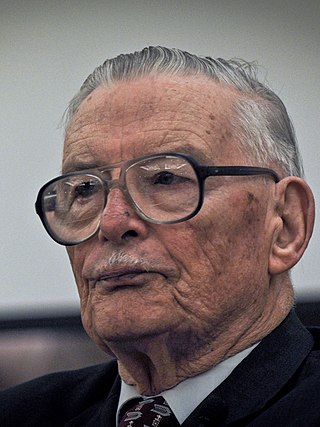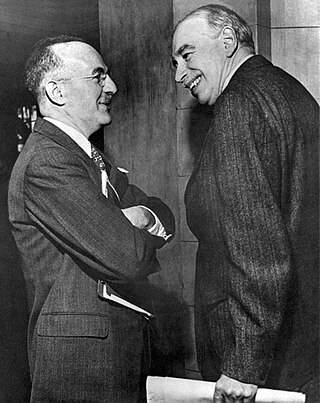Related Research Articles

Joseph Alois Schumpeter was an Austrian political economist. He served briefly as Finance Minister of Austria in 1919. In 1932, he emigrated to the United States to become a professor at Harvard University, where he remained until the end of his career, and in 1939 obtained American citizenship.
Keynesian economics are the various macroeconomic theories and models of how aggregate demand strongly influences economic output and inflation. In the Keynesian view, aggregate demand does not necessarily equal the productive capacity of the economy. It is influenced by a host of factors that sometimes behave erratically and impact production, employment, and inflation.

John Maynard Keynes, 1st Baron Keynes, was an English economist and philosopher whose ideas fundamentally changed the theory and practice of macroeconomics and the economic policies of governments. Originally trained in mathematics, he built on and greatly refined earlier work on the causes of business cycles. One of the most influential economists of the 20th century, he produced writings that are the basis for the school of thought known as Keynesian economics, and its various offshoots. His ideas, reformulated as New Keynesianism, are fundamental to mainstream macroeconomics. He is known as the "father of macroeconomics".

Public choice, or public choice theory, is "the use of economic tools to deal with traditional problems of political science." It includes the study of political behavior. In political science, it is the subset of positive political theory that studies self-interested agents and their interactions, which can be represented in a number of ways—using standard constrained utility maximization, game theory, or decision theory. It is the origin and intellectual foundation of contemporary work in political economy.

James McGill Buchanan Jr. was an American economist known for his work on public choice theory originally outlined in his most famous work, The Calculus of Consent, co-authored with Gordon Tullock in 1962. He continued to develop the theory, eventually receiving the Nobel Memorial Prize in Economic Sciences in 1986. Buchanan's work initiated research on how politicians' and bureaucrats' self-interest, utility maximization, and other non-wealth-maximizing considerations affect their decision-making. He was a member of the Board of Advisors of The Independent Institute as well as of the Institute of Economic Affairs, a member of the Mont Pelerin Society (MPS) and MPS president from 1984 to 1986, a Distinguished Senior Fellow of the Cato Institute, and professor at George Mason University.
The Ricardian equivalence proposition is an economic hypothesis holding that consumers are forward-looking and so internalize the government's budget constraint when making their consumption decisions. This leads to the result that, for a given pattern of government spending, the method of financing such spending does not affect agents' consumption decisions, and thus, it does not change aggregate demand.

"Starve the beast" is a political strategy employed by American conservatives to limit government spending by cutting taxes, to deprive the federal government of revenue in a deliberate effort to force it to reduce spending. The term "the beast", in this context, refers to the United States federal government and the programs it funds, primarily with American tax money, particularly social programs such as education, welfare, Social Security, Medicare, and Medicaid.

Barrington Moore Jr. was an American political sociologist, and the son of forester Barrington Moore.

Alvin Harvey Hansen was an American economist who taught at the University of Minnesota and was later a chair professor of economics at Harvard University. Often referred to as "the American Keynes", he was a widely read popular author on economic issues, and an influential advisor to the government on economic policy. Hansen helped create the Council of Economic Advisors and the Social Security system. He is best remembered today for introducing Keynesian economics in the United States in the 1930s and 40s.
In public choice theory, fiscal illusion is a failure to accurately perceive the amount of government expenditure. The theory of fiscal illusion was first developed by the Italian economist Amilcare Puviani in his 1903 book Teoria della illusione finanziaria. Fiscal illusion occurs when government revenues are not completely transparent or are not fully perceived by taxpayers; then the cost of government is seen to be less than it actually is. Since some or all taxpayers benefit from government expenditures from these unobserved or hidden revenues, the public's appetite for government expenditures increases, thus providing politicians incentive to expand the size of government.

Robert D. Tollison was an American economist who specialized in public choice theory.

Richard Edward Wagner is an American economist. He is professor emeritus of economics at George Mason University. He works primarily in the fields of public finance, public choice, and complexity economics.

Public economics(or economics of the public sector) is the study of government policy through the lens of economic efficiency and equity. Public economics builds on the theory of welfare economics and is ultimately used as a tool to improve social welfare. Welfare can be defined in terms of well-being, prosperity, and overall state of being.
Steven Pressman is an American economist. He is a former Professor of Economics and Finance at Monmouth University in West Long Branch, New Jersey. He has taught at the University of New Hampshire and Trinity College in Hartford, Connecticut.

Following the global 2007–2008 financial crisis, there was a worldwide resurgence of interest in Keynesian economics among prominent economists and policy makers. This included discussions and implementation of economic policies in accordance with the recommendations made by John Maynard Keynes in response to the Great Depression of the 1930s, most especially fiscal stimulus and expansionary monetary policy.
Criticism of democracy, or debate on democracy and the different aspects of how to implement democracy best have been widely discussed. There are both internal critics and external ones who reject the values promoted by constitutional democracy.

The post-war displacement of Keynesianism was a series of events which from mostly unobserved beginnings in the late 1940s, had by the early 1980s led to the replacement of Keynesian economics as the leading theoretical influence on economic life in the developed world. Similarly, the allied discipline known as development economics was largely displaced as the guiding influence on economic policies adopted by developing nations.
Constitutional economics is a research program in economics and constitutionalism that has been described as explaining the choice "of alternative sets of legal-institutional-constitutional rules that constrain the choices and activities of economic and political agents". This extends beyond the definition of "the economic analysis of constitutional law" and is distinct from explaining the choices of economic and political agents within those rules, a subject of orthodox economics. Instead, constitutional economics takes into account the impacts of political economic decisions as opposed to limiting its analysis to economic relationships as functions of the dynamics of distribution of marketable goods and services.
William Breit (1933–2011) was an American economist, mystery novelist, and professional comedian. Breit was born in New Orleans. He received his undergraduate and master's degrees from the University of Texas and his Ph.D. from Michigan State University in 1961. He was an Assistant and associate professor of economics at Louisiana State University (1961–1965) On the recommendation of Milton Friedman he was interviewed and hired at the University of Virginia where he was Associate Professor and Professor of Economics (1965–1983). He returned to his San Antonio as the E.M. Stevens Distinguished Professor of Economics at Trinity University in 1983 and retired as the Vernon F. Taylor Distinguished Professor Emeritus in 2002. He is considered an expert in the history of economic thought and anti-trust economics. He established the Nobel Laureate Lecture Series at Trinity University and is most notable as a mystery novelist where their murder mysteries are solved by applying basic economic principles.

Democracy in Chains: The Deep History of the Radical Right's Stealth Plan for America is a 2017 nonfiction book by Nancy MacLean published by Viking Press. MacLean critically examines public choice economics, the philosophy of economist James M. Buchanan at George Mason University, which became a significant influence on the libertarian movement and the Republican Party, and formed the foundation for the political activities of the Koch brothers in the U.S.
References
- ↑ Douglas, Hernán Cortés (1979). "Reviewed Work: "Democracy in Deficit: The Political Legacy of Lord Keynes" by James Buchanan, Richard Wagner". Cuadernos de Economía. 16 (48): 245–251. JSTOR 41951129.
- ↑ Glahe, Fred R. (1978). "Reviewed Work: Democracy in Deficit: The Political Legacy of Lord Keynes by James M. Buchanan, Richard E. Wagner". Public Choice. 33 (1): 104–107. JSTOR 30023027.
- ↑ Hansen, Susan Blackall (1979). "Democracy in Deficit: The Political Legacy of Lord Keynes. By James M. Buchanan and Richard E. Wagner". American Political Science Review. 73 (4): 1123–1124. doi:10.2307/1953997.
- ↑ James M. Buchanan and Richard E. Wagner, Democracy in Deficit: The Political Legacy of Lord Keynes. New York: Academic Press, 1977.